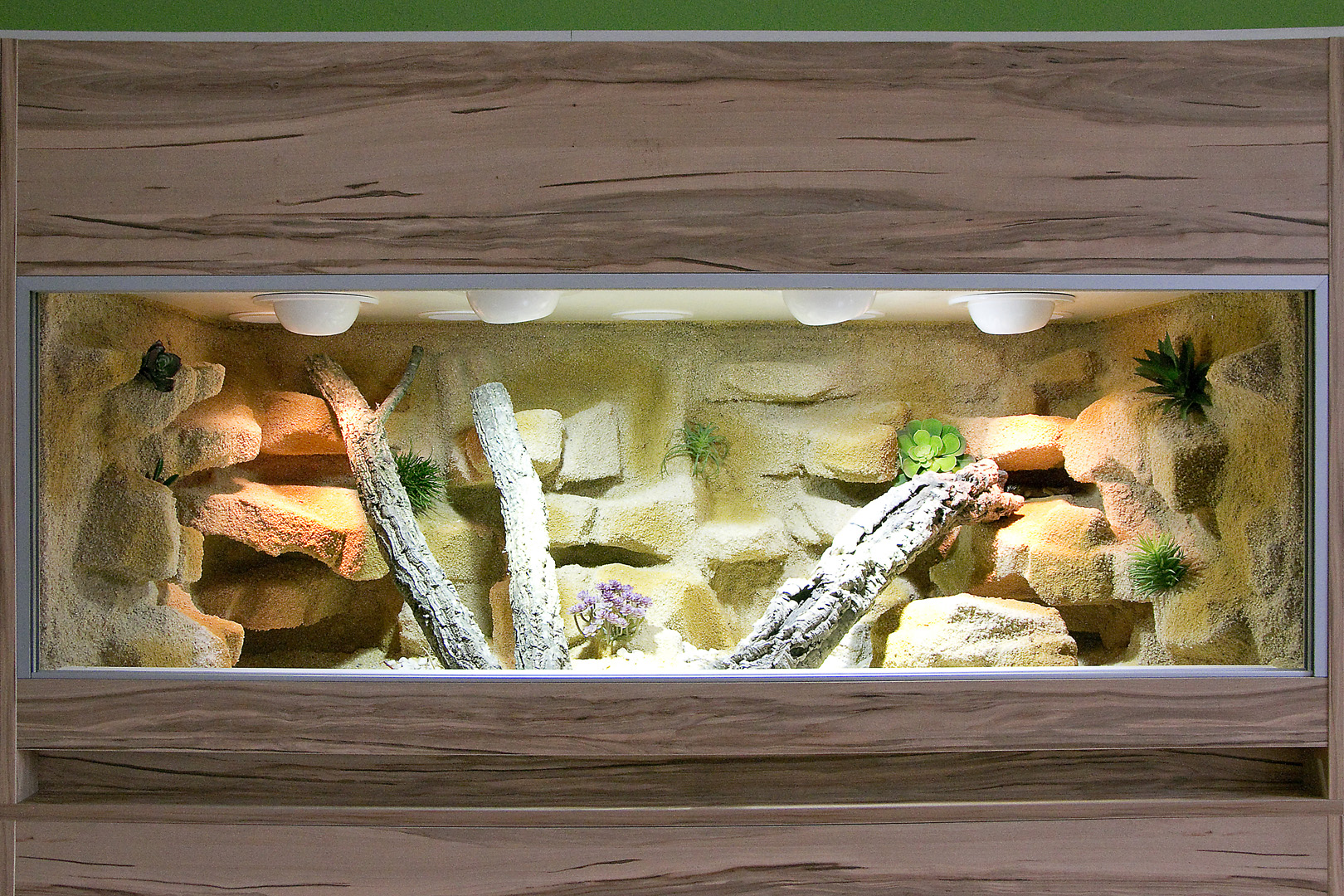
an aquarium with rocks and plants in it
Step 1: Get a terrarium. You will need to buy a terrarium for your leopard gecko. The best size terrarium for 1 adult leopard gecko is 20 gallons. 30 gallons is ideal for 2 leopard geckos. Some owners choose to house their leopard gecko in a 10 gallon terrarium, but there won't be much space for your leopard gecko to move around.

Pin auf terráriumok
As pets Leopard Geckos do well with a relatively simple setup. A 20-gallon long glass terrarium is ideal for a single adult, though they will also be very happy in a larger 35-gallon tank. The overall best substrate for a leopard gecko is a mixture of soil, clay, sand and pebbles.

Pin by Brittany Hendricks on Leopard gecko in 2020 Bearded dragon terrarium, Bearded dragon
This terrarium is a very manageable size and it is affordably priced just over $50. It also features double front doors in an all-glass construction with a screen top. It also has ventilation on the front and a raised bottom to accommodate an under-tank heater, should you choose to use one. Best Affordable. 3.

Terrarium für Leopardgeckos mit vielen engen Quetschpalten
Do you feel your leopard gecko's tank is looking a little boring? Your gecko isn't using most of its tank? Is it staying in its hides most of the time? Well,.

Pin auf natural leopard gecko enclosure
Here are the steps you need to follow: Substrate: The floor of the terrarium should be covered with a substrate that mimics the leopard gecko's natural habitat. The best options are coconut coir, sand or peat moss. Heat source: Leopard geckos need a heat source to regulate their body temperature.

Wüsten/Steppen Terrarium für Leopardgeckos mit vielen engen Spalten und Höhlen Leopardgecko
One of the most popular pets for new reptile owners, leopard geckos have taken over the pet stores. Their relative low-maintenance care is attractive for those who are new to the reptile keeping world, but there are still many specific requirements that come with keeping one. Learn to build a terrific terrarium, provide a balanced diet, and create a healthy, natural habitat for your new gecko.

Das Terrarium derleopardgecko
Idea 3: Arid Hideaway. Construct an arid environment using a blend of sand, rocks, and desert plants. Position hiding spots, such as cork bark or reptile hides, in the tank's cooler and warmer areas. Hiding spots help leopard geckos feel safe and regulate their temperature more efficiently.

Pin on Terrarienidee
The first step is to make a 3-4" deep layer of substrate at the bottom of the tank. It'll help your ground-dwelling geckos enjoy roaming around the tank. This tank design layout shows a perfect assembly of hollow logs, driftwood, and rocks. Your leopard geckos can smoothly take shelter and rest in these hideouts.

Rückwandbau derleopardgecko in 2021 Leopard gecko lebensraum, Leopardgecko, Leopardgecko
The size of the tank is important, as it should provide enough space for your gecko to move comfortably. The kit may also include a heating pad or lamp to maintain the proper temperature in the tank, as leopard geckos require a warm environment.

Pin by Katharina Paul on Leopardgecko Bearded dragon terrarium diy, Reptile terrarium, Terrarium
Here is the list of the most commonly used tank sizes for housing one leopard gecko. 10 gallons (~38 liters) 15 gallons (~57 liters) 20 gallons (~76 liters) As you can see, a 10-gallon tank is the minimum size; however, there is no upper limit, and it's great if you can give your leo an enclosure larger than 20 gallons.

Leopardgecko Haltung und Pflege / Terraristik Shop
The main things you'll need to supply your leopard gecko tank with are: Adequate heating. The enclosure needs a gentle gradient from the hot side (the basking area) to the cooler side. Under the basking area, temperatures should be between 85 to 90F, while the cooler end should be between 75 to 80F.

How to Set Up a Leopard Gecko Terrarium? in 2021 Leopard gecko terrarium, Gecko terrarium
The optimal tank size for one leopard gecko depends on its age. Baby leopard geckos aged 0 to 2 months need a tank of at least 10 gallons. In general, each adult gecko needs at least 20 gallons of space to thrive. Anything less than a 20-gallon is generally too small to fit a food bowl, water bowl, decorations and hides.

My 20Gallon Long Leopard Gecko Enclosure SetUp Leopard gecko habitat, Gecko habitat, Gecko
In a bioactive terrarium, you'll need to create a temperature gradient, ranging from a basking spot of around 90°F (32°C) to a cooler area of about 75°F (24°C). Nighttime temperatures can drop to around 70°F (21°C). To maintain proper humidity levels, aim for a range of 30-40% with a slightly higher humidity level of 60-70% in a.

leopard gecko tanks Google Search Leopardgecko, Leopardengecko, Gecko
When setting up a leopard gecko's habitat, you need to consider its enclosure size and type, the lighting, humidity, temperature, substrate, and all of the things like hides and decor you are going to put in the enclosure. Leopard geckos come from dry grasslands in Asia. This means their enclosures in captivity need to reflect this type of.

The Pangea Forums Crested Geckos & More Leopard gecko lebensraum, Leopardengecko, Gecko
Check out our leopard gecko terrarium decor selection for the very best in unique or custom, handmade pieces from our aquariums & tank decor shops.

Came across this tank set up in a Leopard Gecko group. Don't know who made it, but I think it's
Substrate. The substrate is the foundation of your gecko's bioactive enclosure. Combine a mix of organic matter, such as coconut coir and sphagnum moss with sand and soil. The substrate should be 3-4 inches deep and promote beneficial microorganisms' growth while allowing the clean-up crew to do their job.